Thousands of people yesterday marched from the headquarters of the Democratic Progressive Party (DPP) to the Executive Yuan in Taipei, urging the Cabinet to withdraw its draft amendment to the Labor Standards Act (勞動基準法).
At noon, protesters gathered in front of the headquarters and started to march toward the Legislative Yuan at about 3pm.
One of the organizers, the Taiwan Railway Union, estimated a turnout of more than 10,000 people in the afternoon.
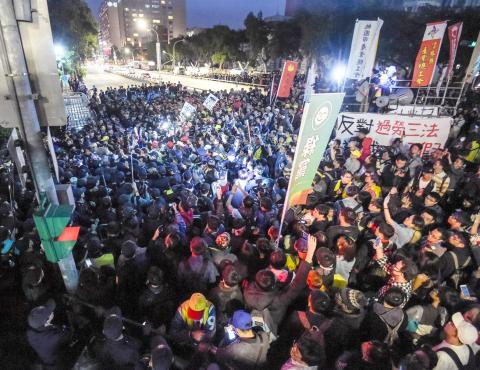
Photo: Huang Yao-cheng, Taipei Times
Several scuffles broke out between protesters and police when police tried to narrow down the demonstration area at the intersection between the Zhongshan N Road and Zhongxiao E Road.
Instead of continuing their march along Zhongxiao W Road, the organizers urged protesters to stage a sit-in at the intersection and wait for the Cabinet to respond to their appeal, but they received no response and dismissed the demonstration at 6pm.
Despite the dismissal, some protesters were still occupying the intersection as of press time last night.
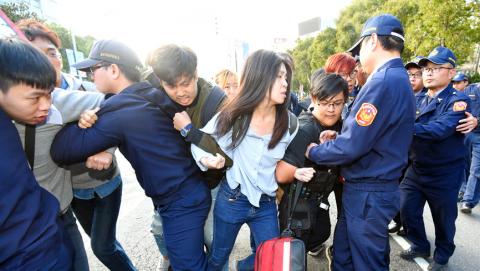
Photo: Liu Hsin-de, Taipei Times
Prior to the dismissal, some protesters tried to break through a police blockade set up in front of the Executive Yuan complex.
One member of the Social Democratic Party, surnamed Lu (呂), was forcibly removed from the scene by police, with his left ear allegedly cut on the wired barricades.
Since the Cabinet announced the draft amendment on Nov. 9, many labor rights groups have been protesting against what they said is the most retrogressive amendment to the act, which was pushed to a second reading by DPP lawmakers on Dec. 4.
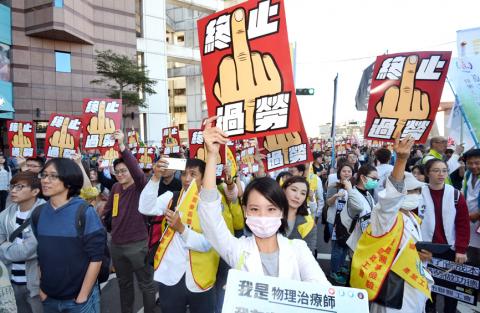
Photo: Liu Hsin-de, Taipei Times
Anticipating the demonstration yesterday, Cabinet spokesperson Hsu Kuo-yung (徐國勇) and Minister of Labor Lin Mei-chu (林美珠) tried to clarify what they called a “misunderstanding” about the draft amendment at a news conference on Thursday.
In the Cabinet’s draft, Article 34 proposes that the interval between two work shifts can be reduced from 11 hours to no less than eight hours if an employer obtains approval from its workers’ union.
Most people oppose the article because they do not understand its two premises: It only applies to those who have to work in shifts, and people are not allowed to work more than 12 consecutive hours, Hsu said.
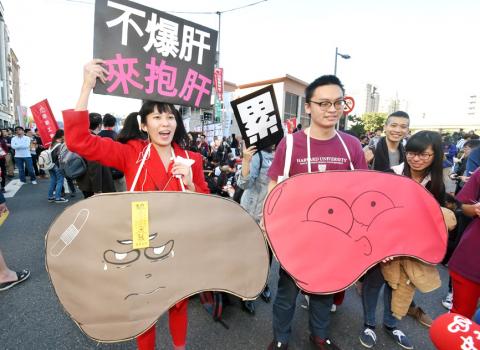
Photo: Liu Hsin-de, Taipei Times
The work schedule of employees can be changed once a week at most, but the restriction becomes irrelevant when employers and employees reach an agreement, according to the draft.
Some lawmakers have tendered motions that propose businesses should obtain the ministry’s approval before they are allowed to shorten workers’ rest intervals, Lin said, adding that the ministry thinks the proposal is feasible and would include it in the final draft.
No one misunderstood the articles, at least the Taipei City Government did not, Taipei Department of Labor Commissioner Lai Hsiang-lin (賴香伶) said yesterday when asked to comment on Hsu’s explanation.

Photo: Liu Hsin-de, Taipei Times
Many hospital management teams, due to staff shortages, are likely to change workers’ schedules almost every day, which is a fact that the Cabinet fails to understand, Lai said, adding that it should encourage businesses to hire more workers instead of easing regulations.
The ministry should set up a registration system and ask businesses adopting shifts to fully reveal their schedule information, she said.
If businesses are to lengthen employees’ working hours, they should obtain approval from the ministry, which could be helpful to prevent employers from abusing the loosened regulation, she added.
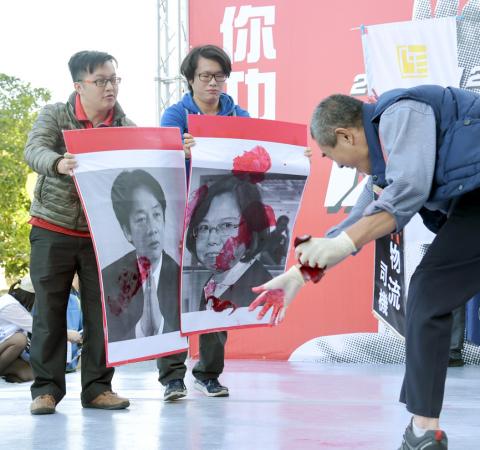
Photo: Huang Yao-cheng, Taipei Times
Employers are likely to force workers to sign agreements that say that they agree with the lengthened work schedules, Taiwan Higher Education Union department director Lin Po-yi (林柏儀) said.
People who have to work in shifts, such as guards, nurses and drivers in the logistics industry, are relatively powerless in society, Lin Po-yi said, adding that the draft amendment would worsen their already poor working conditions.
The DPP has forsaken the public, who cannot but take to the streets to defend its values, Chinese Nationalist Party (KMT) Legislator Chiang Wan-an (蔣萬安) said.
Asked if the KMT has any strategies to boycott the draft amendment in the extraordinary legislative session next month, Chiang said that party members are discussing plans, but cannot reveal them at the moment.
During a visit to Tainan yesterday, Premier William Lai (賴清德) said he would ask the Ministry of Labor to collect the appeals of protesters, but no further response could be solicited from the Cabinet as of press time last night.

ANNOUNCEMENT: People who do not comply with the ban after a spoken warning would be reported to the police, the airport company said on Friday Taoyuan International Airport Corp on Friday announced that riding on vehicles, including scooter-suitcases (also known as “scootcases”), bicycles, scooters and skateboards, is prohibited in the airport’s terminals. Those using such vehicles should manually pull them or place them on luggage trolleys, the company said in a Facebook post. The ban intends to maintain order and protect travelers’ safety, as the airport often sees large crowds of people, it said, adding that it has stepped up publicity for the regulation, and those who do not comply after a spoken warning would be reported to the police. The company yesterday said that
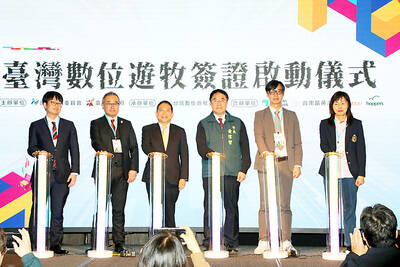
QUIET START: Nearly a week after applications opened, agencies did not announce or promote the program, nor did they explain how it differed from other visitor visas Taiwan has launched a six-month “digital nomad visitor visa” program for foreign nationals from its list of visa-exempt countries who meet financial eligibility criteria and provide proof of work contracts. To apply, foreign nationals must either provide proof that they have obtained a digital nomad visa issued by another country or demonstrate earnings based on age brackets, the Bureau of Consular Affairs said. Applicants aged 20 to 29 must show they earned an annual salary of at least US$20,000 or its equivalent in one of the past two years, while those aged 30 or older must provide proof they earned US$40,000 in
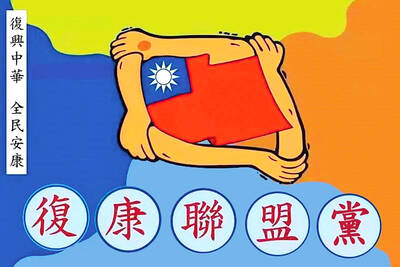
SERIOUS ALLEGATIONS: The suspects formed spy networks and paramilitary groups to kill government officials during a possible Chinese invasion, prosecutors said Prosecutors have indicted seven retired military officers, members of the Rehabilitation Alliance Party, for allegedly obtaining funds from China, and forming paramilitary groups and assassination squads in Taiwan to collaborate with Chinese troops in a possible war. The suspects contravened the National Security Act (國家安全法) by taking photos and drawing maps of key radar stations, missile installations and the American Institute in Taiwan’s headquarters in Taipei, prosecutors said. They allegedly prepared to collaborate with China during a possible invasion of Taiwan, prosecutors said. Retired military officer Chu Hung-i (屈宏義), 62, a Republic of China Army Academy graduate, went to China
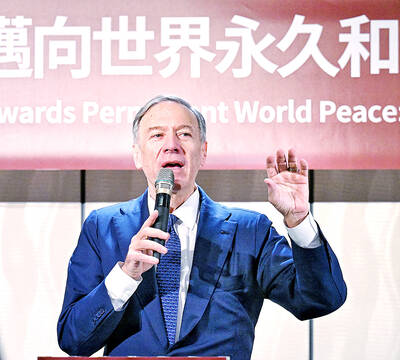
UNITY MESSAGE: Rather than focusing on what Trump said on the campaign trail about Taiwan, Taipei should be willing to engage with the US, Pompeo said Taiwan plays a key role in Washington’s model of deterrence against China, former US secretary of state Mike Pompeo said in a speech in Taipei yesterday. During US president-elect Donald Trump’s first term, “we had developed what we believe was a pretty effective model of deterrence against adversaries who wanted to undermine the set of rules and values that the people of Taiwan and the people of the US hold dear,” Pompeo said at a forum organized by the Formosa Republican Association. “Succeeding in continuing to build this model will not solely rest at the feet of president Trump and his team,